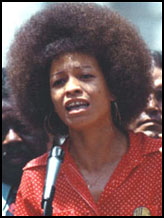

It followed If They Come in the Morning: Voices of Resistance (1971), a collection of writings edited by Davis, including contributions in which she discusses her experiences in prison, and Angela Davis: An Autobiography (1974), which was about the civil rights movement and its impact on her ideology.

The 1981 work Women, Race and Class was Davis' third book. Jackson, being released in 1972 and later acquitted. She was repeatedly fired over her political beliefs and jailed for two years for purchasing guns later used by revolutionary Jonathan P.

After completing a Master's degree, she began teaching philosophy at the University of California, Los Angeles. She later studied under the philosopher Herbert Marcuse and joined the Black Panther Party and Communist Party USA in the late 1960s. She attended Brandeis University, majoring in French. She was an activist from an early age, inspired by female parental figures who opposed the Jim Crow laws, and became involved with socialist groups and Marxism–Leninism. Background Īngela Davis was born in Alabama, United States, in 1944 as the oldest of four children in a black middle-class family. history from the slave trade and abolitionism movements to the women's liberation movements which began in the 1960s. The third book written by Davis, it covers U.S. It contains Marxist feminist analysis of gender, race and class. Davis shows readers how the inequalities between Black and white women influence the contemporary issues of rape, reproductive freedom, housework and child care in this bold and indispensable work.Women, Race and Class is a 1981 book by the American academic and author Angela Davis. Here, Davis not only contextualizes the legacy and pitfalls of civil and women's rights activists, but also discusses Communist women, the murder of Emmitt Till, and Margaret Sanger's racism. While Black women were aided by some activists like Sarah and Angelina Grimke and the suffrage cause found unwavering support in Frederick Douglass, many women played on the fears of white supremacists for political gain rather than take an intersectional approach to liberation.

She should be heard."- The New York Times Angela Davis provides a powerful history of the social and political influence of whiteness and elitism in feminism, from abolitionist days to the present, and demonstrates how the racist and classist biases of its leaders inevitably hampered any collective ambitions. "Angela Davis is herself a woman of undeniable courage. From one of our most important scholars and civil rights activist icon, a powerful study of the women's liberation movement and the tangled knot of oppression facing Black women.


 0 kommentar(er)
0 kommentar(er)
